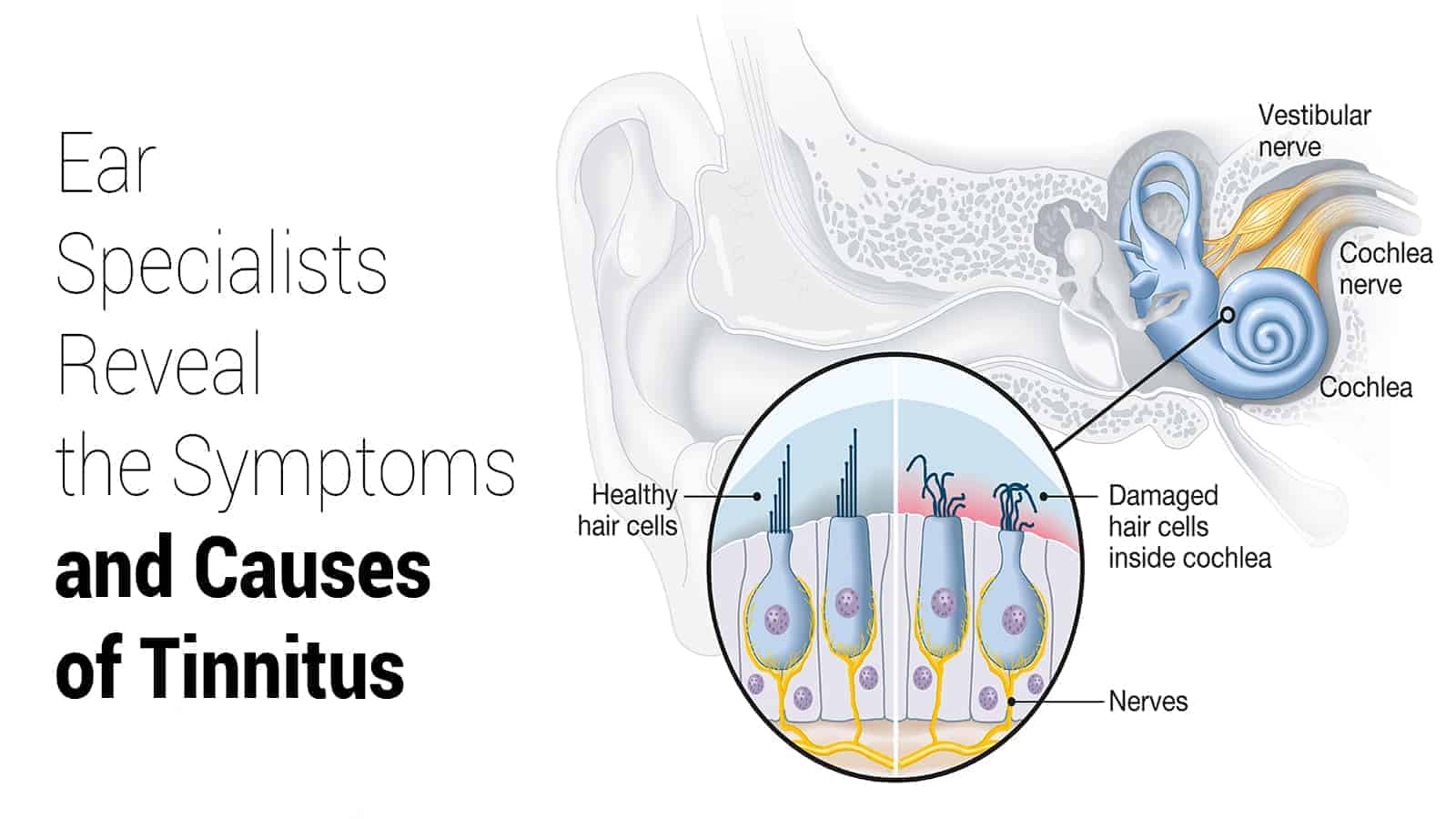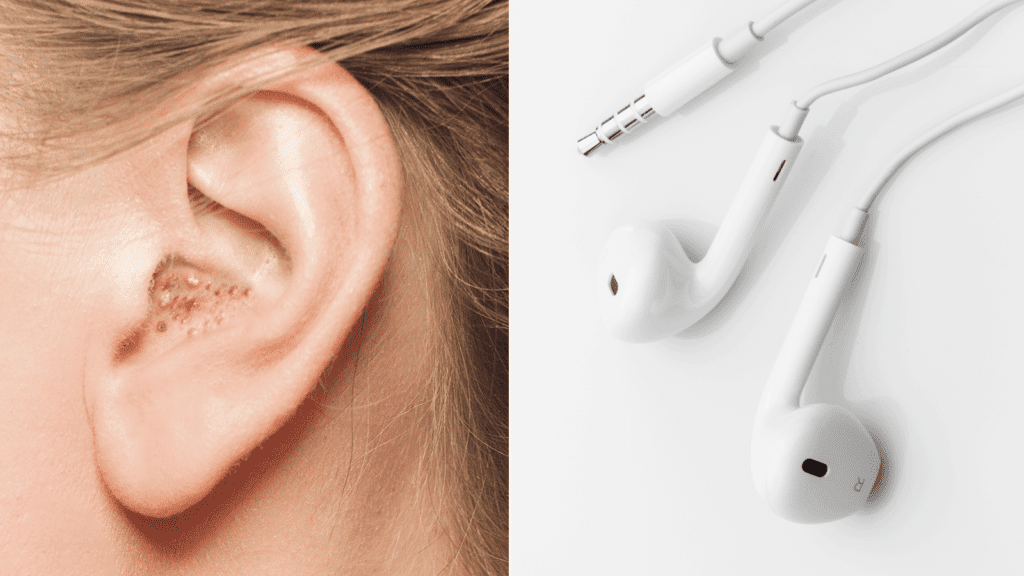Did you know that 32% of the adult population in the United States suffers from an ailment called tinnitus? That’s a whopping 50 million Americans who experience a debilitating but typically preventable condition. So what causes tinnitus? And what symptoms should you look for?
All about tinnitus
Tinnitus is ringing, clicking, humming, hissing, or buzzing sounds in your ears. These distracting noises can show up in one or both ears lasting for just seconds or hours. Researchers say that tinnitus is not a condition, but a sign of an underlying health problem such as a nervous system problem, an ear injury, or the early stages of hearing loss. Studies by ear specialists note that although you hear a noise in your ears, the source of this noise is from the network of your brain cells that help you make sense of sounds your ears hear. Researchers aren’t sure what’s going on in your brain to create these fake sounds.
How does tinnitus develop?
Tinnitus may develop slowly over time or happen suddenly. It can show up within weeks. At times, tinnitus goes away for a while, only to return. If you experience tinnitus for more than two weeks, contact an ear, nose, and throat doctor for a check-up.
What causes tinnitus?
There are many reasons why people get tinnitus. Here are some common reasons you should know about, so you avoid getting tinnitus.
1 – Infections
Tinnitus can occur from an ear infection. Ear infections arise from bacteria or a virus inside your middle ear. Sometimes you get an ear infection because of a cold or sinus infection. Swelling and congestion build up inside your nasal passages, your throat, and Eustachian tubes, which can result in infection. You can also get an ear virus from cleaning your ears with a cotton swab. Your ears are self-cleaning, so avoid putting anything inside your them.
2 – Medications
There are over 200 medications that might cause tinnitus or make it worse. Here are just some of the medicines that may cause tinnitus.
- Antibiotics
- Cancer medications
- Diuretics
- Quinine medications
- Anti-depressants
- Aspirin (if you take too much)
3 – Loud noises
Your ears have tiny hairs inside the inner ear that move or vibrate when sound waves hit them. As the hairs move around, your cells send an electrical signal via a nerve from your ear to your brain, causing your mind to tell you what you just heard. Loud noises can break or bend these little hairs causing wrong signals to get sent to your brain, which then causes tinnitus.
It’s essential for you to guard your ears against loud noises. Here are a few suggestions on the best way to protect your ears.
- Wear ear muffs or noise-reducing ear headphones in noisy areas
- Keep the volume down while listening to music on earbuds or earplugs.
- If you work in a noisy environment such as a factory, construction, road work, or a musician, try to protective muffs for your ears.
4 – Anxiety and Stress
Hearing and ear researchers explain that sometimes tinnitus occurs due to high levels of anxiety or stress. Because stress can cause other health problems, it’s hard to know if the tinnitus is a direct result of anxiety and stress or a byproduct of other health issues caused by stress. But they do know that if you’re struggling with stress, you’re at a greater risk of developing tinnitus. How do you know if you’re stressed? If you’re stressed, you’ll feel some or all of these symptoms.
- Fast heartbeat
- Nausea or stomach feeling tight
- Lack of focus
- Feel tense
- Irritable
- Bowels or bladder irritability
- Insomnia
- Feeling fatigued
- Headaches
5 – Neck or head injuries
If you’ve been in an accident that affected your neck or head, you can get tinnitus. This is because the nerves related to your ears may get damaged. If the nerves heal, the tinnitus may go away. You may wish to see a chiropractor for neck adjustments. This is a natural way to restore your necks muscles, tissue, and nerves to normal.
6 – Tumors
Some people develop tumors along the cranial nerve that controls the inner ear. This mass can cause tinnitus. These are usually benign tumors, and when they’re removed, the tinnitus will go away.
7 – Muscles spasms
Suppose the muscles in your inner ear tighten up, causing tinnitus and hearing loss. It can be due to multiple sclerosis or other neurological diseases.
8 – Coronary artery disease
As you age, cholesterol can build up in your arteries. This may cause blockages near your inner ear areas, taking away the area’s ability to move around and blocks proper blood flow. Thus, you get a roaring sound in your ears. It’s essential to incorporate healthy eating and exercise habits throughout your life, so you don’t end up with these artery diseases later in life.
What are the symptoms of tinnitus?
So, how do you know if you have tinnitus? Typically you’ll hear a sound that you know isn’t there. Tinnitus sounds have been described as a roaring, clicking, rushing, or chirping sound. Some people say it’s like listening to ocean waves. You may hear a heartbeat. It may be constant or once in a while. You may have it in one or both ears.
Having tinnitus can also be a constant ringing in your ears. It can be a distraction unless you learn to ignore it. Tinnitus can interrupt your sleep, concentration, and may even cause emotional problems in some people. Surprisingly, one way to deal with the fake noise of tinnitus is to mask it with real noise from a fan, a white noise machine, or music.
Treatments for tinnitus
There is not a hard-and-fast cure for tinnitus, but you will find effective treatments that can help you cope with it. You may feel like you can deal with it yourself, and that’s fine. But if at any point, if you feel like it’s impacting your life too much, you may need to consider getting medical help. Ask yourself these five questions to assess if you need some possible treatments.
- Does having tinnitus limit my lifestyle?
- Am I enjoying life despite the tinnitus?
- Am I having a hard time relaxing with the tinnitus?
- Does the tinnitus make me feel irritated a lot?
- What percentage of my day is bothered by tinnitus? 10%, 25% or 50%?
Once you decide to get help, here are some possible treatments that may help you.
Hearing aids
Did all those concerts you attended in college finally catch up with you? If so, it could be time to get hearing aids. These aids not only deal with your hearing loss but can help you get rid of annoying tinnitus.
Counseling
Learning to cope with tinnitus is essential. Talking with a counselor may help you adjust to your new normal. Plus, seeing a counselor gives you some good coping strategies.
Wearable sound machines
It sounds incredible, but there are small devices that you can fit into your ear that will give off a soft sound that masks the tinnitus roar. This device can be adjusted to cover up all types of tinnitus noise.
Portable sound generators
These devices do the same as the wearable ones, but they’re portable so you can move them around wherever you go. You can choose waterfalls, waves, rain, or other sounds to distract you from the tinnitus.
Cochlear implants
This procedure is usually done when you have hearing loss as well as tinnitus. The implant bypasses all the damaged parts of your inner ear. It then sends an electrical signal to your auditory nerve, so your brain gets the proper signal. It also hides tinnitus.
Beware of false claims of cures that are not realistic.
Be aware that many scams are claiming to cure tinnitus. It would be great if eating certain foods or taking a concoction of herbs could heal tinnitus. But this isn’t reality. Don’t fall for these claims. As challenging as it is to cope with living with tinnitus, spending vast amounts of money on fake remedies will only make you feel worse.
Final Thoughts on Understanding Tinnitus
Tinnitus is becoming more common in young adults. Earplug and headphones cause wearers to turn up the volume to the point where they damage their hearing. Teach your children to keep the volume low on these devices. Train yourself to listen to music at a lower volume. At first, you’ll feel like you can’t hear, but over time your ears will adapt to the softer sounds.
Tinnitus is a real problem. It’s worth understanding the causes and how to prevent it. Nothing is worth losing your hearing, so reconsider your job if it might cause you hearing loss down the road. Protect your ears from loud noises by keeping a pair of ear muffs handy. Don’t clean your ears with cotton swabs or put things in your ears. If you get a sinus infection or a cold, treat it according to your doctor’s instructions by taking your medication for the right length of time. Eat healthy food and exercise to avoid coronary diseases that could result in hearing loss. Hearing tomorrow is worth the extra effort it may take today to protect your ears.
















 Community
Community

